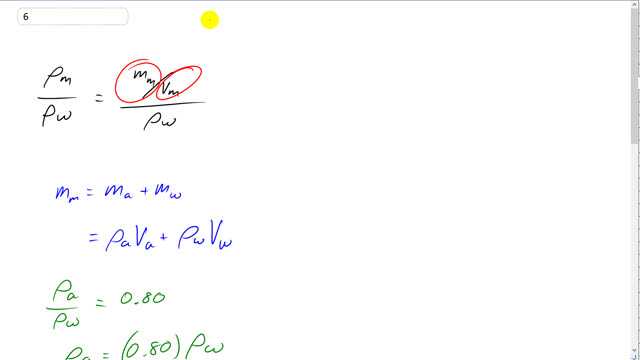If 4.0 L of antifreeze solution (specific gravity = 0.80) is added to 5.0 L of water to make a 9.0-L mixture, what is the specific gravity of the mixture?

In order to watch this solution you need to have a subscription.
This is Giancoli Answers with Mr. Dychko. The specific gravity of the mixture will be the density of the mixture divided by the density of water and the density of the mixture is the mass of the mixture divided by its volume and we need to know what these things are so we need to know the mass of the mixture then. So the mass of the mixture will be the mass of the antifreeze solution plus the mass of the water that's combined and the mass of the antifreeze will be antifreeze's density multiplied by its volume and then mass of the water will be the water's density times its volume. And we know the specific gravity of the antifreeze is 0.80 so that means the density of antifreeze divided by density of water is 0.80 and we can multiply both sides by density of water and we get density of the antifreeze is 0.80 times density of water and then we can substitute that here in the next line. So I put 0.80ρ w in place of ρ a so the mass of the mixture is 0.80 times density of water times the volume of the antifreeze plus density of the water times the volume of the water. So then we can factor out this common factor ρ w and we have ρ w times 0.80V a plus V w and that is what we'll substitute in for mass of the mixture into this formula on the next line. So we have, returning to the very beginning, where we have specific gravity of the mixture, density of mixture divided by density of water is the mass of the mixture which we just figured out here divided by the volume of the mixture divided by density of water and these density of water's will cancel leaving us with 0.80V a plus V w over V m. And the antifreeze volume is 4.0 and the water volume is 5.0 and they combine to make a mixture volume of 9.0 and you put all that into your calculator and you get 0.91 is the specific gravity of this mixture.
At the end, does the density of water on cancel on both sides of the equation?
Hi acw, thank you for your question. At 1:40 I show the density of water in the denominator on the right side canceling with the density of water that shows up in the numerator of the right side after substituting for mass of the mixture in the numerator. This means the density of water factor in the denominator on the left side stays right where it is since there is no corresponding factor on the right any more. Alternatively, at the very beginning, one could multiply both sides by the density of water, thereby canceling them on both sides, which I think is what you have in mind.... but, after substituting for the mass of the mixture there will nevertheless be a density of water factor appearing again, resulting in the same answer.
All the best,
Shaun
